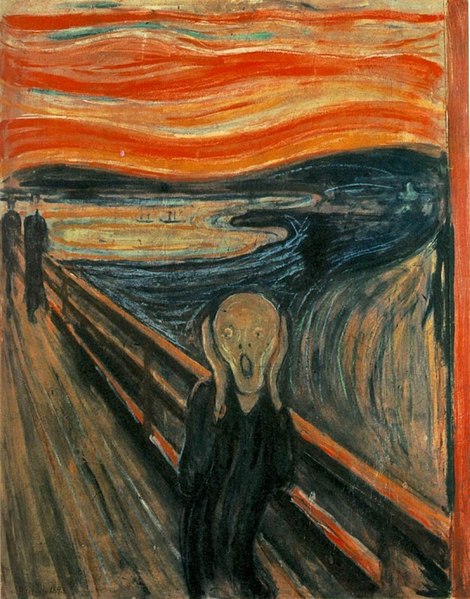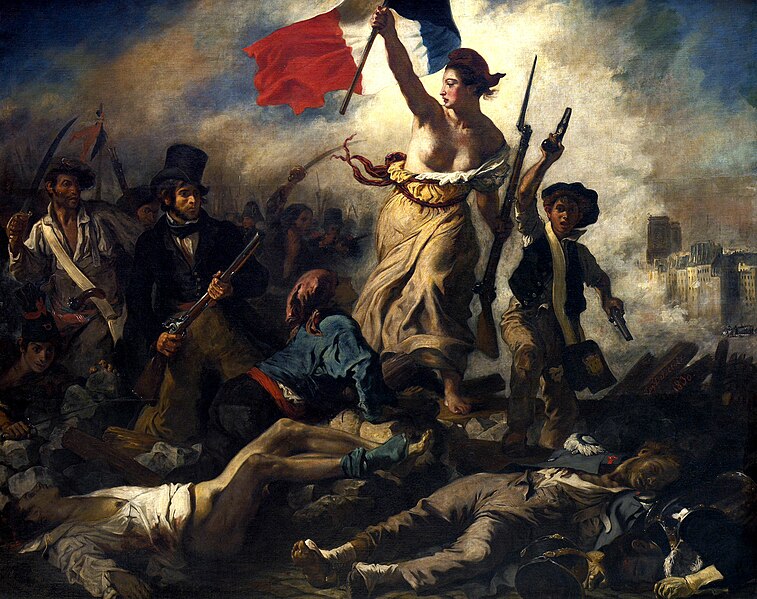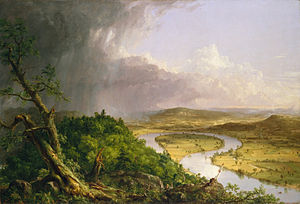All AP Art History Resources
Example Questions
Example Question #292 : Ap Art History

This work in particular and JMW Turner's style in general were precursors to which later, significant artistic movement?
Impressionism
Cubism
Realism
Neo-Classicalism
Impressionism
JMW Turner often used quick brushstrokes, lighter colors, and a loose representation of objects in order to convey natural elements, especially movement and light. These techniques and their ability to shape outdoor scenes were hugely influential on the French Impressionists of the later nineteenth century.
Image is in the public domain, accessed through Wikipedia Media Commons: https://commons.wikimedia.org/wiki/File:Slave-ship.jpg
Example Question #221 : Renaissance To Contemporary 2 D Art
An American Impressionist known for her paintings of mothers with their children is _________________.
Georgia O'Keefe
Mary Cassatt
Dorothea Lange
Berthe Morisot
Mary Cassatt
Dorothea Lange was a 20th century photographer. Georgia O'Keefe was a Precisionist known for her paintings of flowers and bones. Berthe Morisot is a French Impressionist. Mary Cassatt was born in Pennsylvania and moved to Europe to study art, where she met Degas and other Impressionists.
Example Question #106 : Nineteenth Century 2 D Art

The Coiffure, by Mary Cassatt, is related to the artistic movement _____________________.
Fauvism
Impressionism
Neo-Classicalism
Surrealism
Impressionism
Mary Cassatt was the only American woman to be actively involved as an artist in the late nineteenth century French avant-garde art movements. While this work is not traditionally impressionistic, especially as it is a drypoint print rather than a painting, it shares many similarities in tone and style to the works of the Impressionists Cassatt worked so closely with in France. Most notably, the influence of Japanese art, the everyday subject, and the free lines are hallmarks of Impressionism as an artistic movement.
Image is in the public domain, accessed through Wikipedia Media Commons: https://commons.wikimedia.org/wiki/File:Mary_Cassatt_-_The_Coiffure_-_NGC_29882.jpg
Example Question #51 : Identifying Artists, Works, Or Schools Of Nineteenth Century 2 D Art

This work is by which British painter?
George Romney
J.M.W. Turner
John Constable
Joshua Reynolds
Thomas Gainsborough
J.M.W. Turner
All are famous British painters of the 18th and 19th centuries, however the distinctive use of light, the focus on sea and sky, and the fact of its distinct popularity mean this must be the work of J.M.W. Turner.
Image is in the public domain, accessed through WikiArt: http://www.wikiart.org/en/william-turner/the-fighting-temeraire-tugged-to-her-last-berth-to-be-broken-up-1839
Example Question #111 : Nineteenth Century 2 D Art
Monet and Manet were part of the ___________ movement in the 19th century.
Impressionist
Cubist
Dada
Expressionist
Romantic
Impressionist
Both Monet and Manet are known to be part of the Impressionist movement of the 19th century.
Though their works share characteristics of the Romanticism such as a preference for broad colored stroked over contours, the time period does not match (in fact, Impressionism followed from Romanticism).
Cubism, Expressionism, and Dadaism followed from the impressionist movement and are characterized by different artists. These movements began to gain traction in the beginning of the 20th century.
Example Question #111 : Nineteenth Century 2 D Art
Identify the artist who created this painting.

Berthe Morisot
Édouard Manet
Edvard Munch
Eugène Delacroix
Vincent Van Gogh
Edvard Munch
This painting, The Scream, was created by Munch between 1893 and 1910. It is of the impressionist style that heavily influenced the expressionist movement that followed.
Though Manet and Van Gogh share similar styles to this painting, they both died before the turn of the 20th century. Morisot also died before the 1900s.
Image is in the public domain, accessed through Wikipedia Media Commons: https://commons.wikimedia.org/wiki/File:The_Scream.jpg
Example Question #56 : Identifying Artists, Works, Or Schools Of Nineteenth Century 2 D Art
Identify the artist who created this painting.

Eugène Delacroix
Francisco de Goya
Sandro Botticelli
Rembrandt
Jean-Auguste-Dominique Ingres
Francisco de Goya
This painting, Saturn Devouring His Son, was part of Goya's "Black Paintings" Collection, which was inspired by his disillusionment following the Spanish Inquisition.
The only painters to have a similar style would be Rembrandt and Botticelli, however they do not meet the period of this piece.
Though Delacroix and Ingres created paintings during the early 1800s, they did not create works relating to Greek/Roman mythology, nor did they employ this brushstroke style.
Image is in the public domain, accessed through Wikipedia Media Commons: https://en.wikipedia.org/wiki/Saturn_Devouring_His_Son#/media/File:Francisco_de_Goya,_Saturno_devorando_a_su_hijo_%281819-1823%29.jpg
Example Question #51 : Identifying Artists, Works, Or Schools Of Nineteenth Century 2 D Art
Liberty Leading the People, shown below, was created in 1830 by _____________.

Eugène Delacroix
Paul Cézanne
Édouard Manet
Jean-Auguste-Dominique Ingres
Pierre-Auguste Renoir
Eugène Delacroix
Delacroix is responsible for this piece, and can be identified by the Romantic style employed.
Though Ingres was a contemporary of Delacroix, the two were nemesis and Ingres followed a Neoclassical approach.
Manet, Cézanne, and Renoir were impressionist painters and do not fit the period or the style of this painting.
Image is in the public domain, accessed through Wikipedia Media Commons: https://commons.wikimedia.org/wiki/File:Eug%C3%A8ne_Delacroix_-_La_libert%C3%A9_guidant_le_peuple.jpg
Example Question #301 : 2 D Art

Based on style and composition, the work shown here was composed by a member of the artistic group known as _______________.
the Realists
the Norwich School
the Hudson River School
the Impressionists
the Hudson River School
This work, The Oxbow (View From Mount Holyoke, Northampton, Massachusetts, after a Thunderstorm), was painted by Thomas Cole, the founder of the artistic movement known as The Hudson River School. The Hudson River School was the first art movement prevalent in the United States of America, flourishing from 1830-1860. The Hudson River School focused on large scale landscapes, usually of scenes in and around the Hudson River Valley in New York, with a focus on scenes of natural beauty and wonder, oftentimes featuring ominous weather or hazardous wild features.
Artwork from Wikimedia Commons: https://commons.wikimedia.org/wiki/File:Cole_Thomas_The_Oxbow_(The_Connecticut_River_near_Northampton_1836).jpg
Certified Tutor
Certified Tutor
All AP Art History Resources



